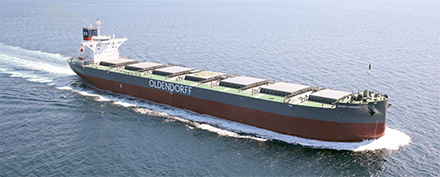A deal has been finalised that will see the largest vessel to ever call at New Zealand for the loading of logs. The deal is between South Pacific Shipping (SPS) and Oldendorff Carriers and was brokered by Braemar ACM’s Bruce McFarlane. Source: Timberbiz
Braemar also negotiated the deal with ISO Stevedoring that delivered the mobile cranes to the port of Tauranga, New Zealand last year.
“We saw an opportunity to bring together two major players from the logs trade and dry bulk shipping to create new economies of scale through the utilisation of the new mobile shore cranes and larger vessels at Tauranga,” Mr McFarlane said.
Cameron Mackenzie from South Pacific Shipping said that they were excited to be a part of this Post Panamax fixture with Oldendorff Carriers.
“Not only will this be the biggest vessel to load logs from New Zealand, loading a gearless ship is also a first for the New Zealand log export industry. Our objective is to make the supply chain as efficient as possible while maximising port throughput, as well as minimising the environmental footprint from the transportation of logs,” he said.
Oldendorff Carriers has been part of the New Zealand logs trade for decades. The opportunity to partake in the first Post-Panamax to load logs from New Zealand suited Oldendorff’s flexibility and diversity.
With more than 700 vessels in its operating fleet that range from 11,000 mt deadweight through to 210,000 mt deadweight, Oldendorff has been able to draw from its extensive fleet to quickly adjust to SPS’s developing shipping requirements.
“We are extremely pleased to have been able to combine our commercial, operational and technical expertise from our Melbourne office, with our large fleet, to bring new economies of scale to our clients,” Peter Twiss, CEO of Oldendorff Carriers said.
Oldendorff Carriers has now concluded two deals that will bring Post-Panamax vessels to load logs from Tauranga. Both fixtures will see Oldendorff provide ships that will be over 30,000mt deadweight more than the current largest vessel to have loaded logs from New Zealand.
“A Post-Panamax will carry underdeck twice the volume of a conventional logger, but will not require any fumigation by Methyl Bromide as no logs will be carried on deck. This deal is also good for the environment,” Mr Mackenzie said.
The logs are sourced from Pacific Forest Products (PFP) and supplied entirely from sustainable plantation forests. The bigger vessels will allow ISO Stevedoring to utilise their new high-capacity shore cranes, improving both loading speeds and stevedore safety.
The vessel will transport the logs from the Port of Tauranga with no deck cargo fumigation or lashing required, which will mean faster and more efficient loading that increases berth utilisation.
Moving to the larger “Post Panamax” vessel will allow the logs to be transported with a lower carbon output per CBM, compared with shipping on a regular handysize logger.
If the Post Panamax loading goes to plan, and freight rates remain proportionate to current levels, SPS will look to charter further Panamax vessels to capture ongoing gains obtained from supply chain efficiency and safety.
The first vessel to load is scheduled to be the MV Clemens Oldendorff, which is due to load from Tauranga at the end of October, or early November 2021.






